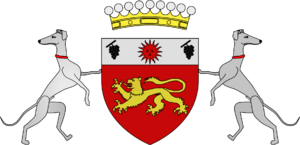Jean-Baptiste Bernard Viénot de Vaublanc facts for kids
Jean-Baptiste Bernard Viénot, chevalier de Vaublanc was a brave French soldier. He was born on September 17, 1761, in Ouanaminthe, a place called Saint-Domingue (which is now Haiti). He passed away in Lithuania on December 19, 1812. He was also the younger brother of another important person, Vincent-Marie Viénot de Vaublanc.
Contents
Early Life and Military Start
Jean-Baptiste studied at a military school in Paris. When he was 16, he went back to Saint-Domingue. There, he joined his first military campaign.
Fighting for American Independence
He fought in the American War of Independence as a lieutenant. He was part of a special group of French soldiers from the Antilles. On March 12, 1779, he helped in the siege of Savannah in Georgia. He also took part in battles led by La Motte Picquet.
The new American government thanked Jean-Baptiste and other French officers. They gave them land as a reward. However, he had to leave the army on March 6, 1780, because he was not well.
Challenges and New Roles
Later, he became a Bodyguard in 1783. He then served as a 2nd Lieutenant in the Alps Light Infantry. He continued to rise through the ranks. He became a Lieutenant in the 10th Light Infantry Regiment.
On June 15, 1791, he became a Captain in the National Gendarmerie. He was promoted to Adjutant General and Chef de Bataillon in 1792. General Pichegru then made him a Brigadier General. This meant he joined the Army of the Rhine.
He was later moved to the 6th Division under General Reed. In October 1793, he faced some difficulties. He was seen as too gentle and came from a noble family. Despite this, he kept his position.
On June 7, 1794, he married Marie-Charlotte Sophie Pion de Mieslot. Later that year, on October 9, he was suspended from duty again. This time, it was due to suspicion of certain political activities. But he was put back in his job on January 15, 1795.
On April 3, 1795, he decided to leave the army. He then settled down in Besançon. In May 1795, he and his godfather, Antoine Pion, were arrested. This was because of their political actions. In March 1796, he was named the Administrator of the Central School of Doubs.
Life as a Revenue Inspector
Because he didn't have a clear military rank, he got a new job. On February 7, 1800, he became a Revenue Inspector. This was a new position, sometimes called "Guardian of the Treasure of the Grande Armée." His job was to manage money for the army. This included taxes, sales, and soldier payments.
He was sent to the Calvados area. In 1803, he moved to Montpellier. His son, Vincet-Victor Henri Viénot de Vaublanc, was born there.
In 1807, he took part in campaigns in Spain and Portugal. Napoleon himself promoted him there. He became the Chief Revenue Inspector for a special army group. This group was called the 1st Observation Corps of the Gironde. It was led by General Junot.
The Army of Spain started with 25,000 men. By the time it reached Lisbon on November 30, 1807, only 1,500 men were left. Jean-Baptiste was made a member of the Portuguese Council. This council was led by General Junot. Jean-Baptiste worked as a secretary for the council.
The Council of Portugal first met in the Palace of Queluz. This was during the French control of Lisbon. Later, it moved to the center of the country in 1807–1808. This followed the Treaty of Fontainebleau between France and Spain.
Final Campaign and Legacy
In 1812, Jean-Baptiste was named Chief Revenue Inspector of the Grande Armée. He started getting ready for the invasion of Russia. Even though his family and Marshall Berthier protested, he had to join the Russian invasion. He went with the Grande Armée into Russia, even though his health was failing.
As the army retreated from Russia, Jean-Baptiste saved a painting from the Moscow fires. He kept it with his things. But soon, he had to walk, holding his sword. He had a fever, and his feet were bleeding.
Despite everything, Jean-Baptiste made it to Gambinen in Prussia. This was near Vilnius, Lithuania. But he finally died there because of the harsh war conditions. He wrote a letter for France saying, "What folly should be mine to have come this far, were it not the most valid reasons that drove me!"
He had written a book about military administration, but it was never published. Even though he managed the Empire's money, he died without any wealth. He left no inheritance behind.
See also
 In Spanish: Jean-Baptiste Bernard de Vaublanc para niños
In Spanish: Jean-Baptiste Bernard de Vaublanc para niños
 | Claudette Colvin |
 | Myrlie Evers-Williams |
 | Alberta Odell Jones |


